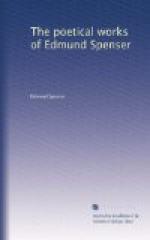“Long thus I ioyed in my happinesse,
And well did hope my ioy would have no end;
But oh! fond man! that in worlds ficklenesse
150
Reposedst hope, or weenedst Her thy frend
That glories most in mortall miseries,
And daylie doth her changefull counsels bend
To make new matter fit for tragedies.
“For whilest I was thus without dread or dout,
155
A cruel Satyre with his murdrous dart,
Greedie of mischiefe, ranging all about,
Gave her the fatall wound of deadly smart,
And reft from me my sweete companion,
And reft from me my love, my life, my hart:
160
My Lyonesse, ah woe is me! is gon!
“Out of the world thus was she reft away,
Out of the world, unworthy such a spoyle,
And borne to heaven, for heaven a fitter pray;
Much fitter then the lyon which with toyle
165
Alcides slew, and fixt in firmament;
Her now I seeke throughout this earthly soyle,
And seeking misse, and missing doe lament.”
Therewith he gan afresh to waile and weepe,
That I for pittie of his heavie plight
170
Could not abstain mine eyes with teares to steepe;
But when I saw the anguish of his spright
Some deale alaid, I him bespake againe:
“Certes, Alcyon, painfull is thy plight,
That it in me breeds almost equall paine,
175
“Yet doth not my dull wit well understand
The riddle of thy loved Lionesse;
For rare it seemes in reason to be skand,
That man, who doth the whole worlds rule possesse,
Should to a beast his noble hart embase,
180
And be the vassall of his vassalesse;
Therefore more plain areade* this doubtfull case.”
[* Areade, explain.]
Then sighing sore, “Daphne thou knew’st,”
quoth he;
“She now is dead”: no more endur’d
to say,
But fell to ground for great extremitie;
185
That I, beholding it, with deepe dismay
Was much apald, and, lightly him uprearing,
Revoked life, that would have fled away,
All were my selfe through grief in deadly drearing*.
[* Drearing, sorrowing.]
Then gan I him to comfort all my best,
190
And with milde counsaile strove to mitigate
The stormie passion of his troubled brest;
But he thereby was more empassionate,
As stubborne steed that is with curb restrained
Becomes more fierce and fervent in his gate,
195
And, breaking foorth at last, thus dearnely* plained:
[* Dearnely, sadly.]
I.
“What man henceforth that breatheth vitall aire
Will honour Heaven, or heavenly powers adore,
Which so uniustly doth their iudgements share
Mongst earthly wights, as to afflict so sore
200
The innocent as those which do transgresse,
And doe not spare the best or fairest more
Than worst or foulest, but doe both oppresse?




